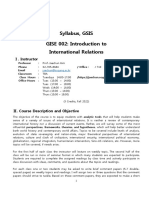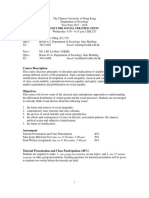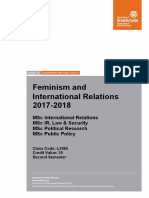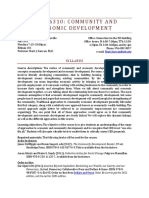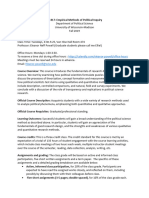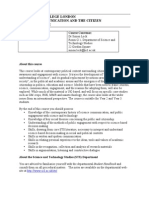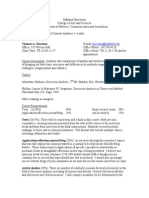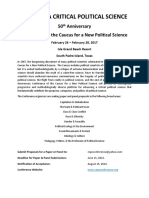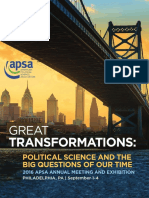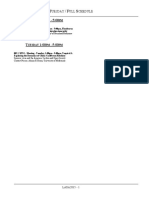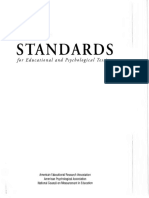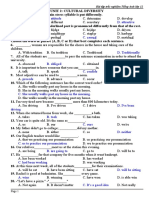IR Theory - Arfi
IR Theory - Arfi
Uploaded by
illosopher94Copyright:
Available Formats
IR Theory - Arfi
IR Theory - Arfi
Uploaded by
illosopher94Copyright
Available Formats
Share this document
Did you find this document useful?
Is this content inappropriate?
Copyright:
Available Formats
IR Theory - Arfi
IR Theory - Arfi
Uploaded by
illosopher94Copyright:
Available Formats
International Relations Theory
INR 6607 SECTION 7586 DEPARTMENT OF POLITICAL SCIENCE UF FALL 2008 Prof. Badredine Arfi Office: 209 Anderson Hall Phone: (352) 273-2357 Place: CBD 234 Time: W 3:00 6:00pm Periods 8-10 Email: barfi@ufl.edu Office hours: Mondays 4:00-5:00p.m. Tuesdays 4:00-5:00p.m. By appointment DESCRIPTION This course is designed as a focused introduction to various theories and approaches to the study of international relations. Although social theory and philosophy have thrived in the last two hundred years or so with much new incisive/decisive insight about the foibles of human societies and systems, IR scholars are still bogged down with recycling much of the same dj-vu thinking. Whereas we have learned and can and should still keep learning from so-called conventional IR theory, it is simply nave and self-wounding to keep ignoring the tremendous achievements that many more social theorists and philosophers have accomplished, especially in the latter part of the twentieth and early twenty-first centuries. This sustained lack of serious and thorough learning from social theory and philosophy emerges as one of the most important impediments that might explain the not-so-exciting fate of IR theories in explaining and understanding momentous and many less-than momentous events and issues that have been unfolding for the last hundred years or so. As a way of alerting students to these lingering disciplinary issues as well as equipping them with effective tools which they will definitely find useful as future scholars dealing with IR issues, this course seeks to explicate key theoretical assumptions underpinning various IR approaches as well as exploring just how and why they are worthwhile considering that is, in what ways they challenge conventional IR theory, and in what ways they compare and contrast with each other. CONSTITUTIVE AND REGULATIVE RULES Students are required to digest the weeks readings before each class and thus come to class prepared to fully discuss the readings in depth and share their wisdom with the class. Each student is required to formulate two discussion questions generated by the readings each week, and submit them to the course WebCT every Tuesday 1:00-8:00pm (look for Weekly Student Question Sets Folder)
UF INR 6607 Section 7586 Fall 2008 International Relations Theory Each student is required to write ten 3-4 page summary/critique papers over the course of the semester. The papers are to be submitted to WebCT on Tuesday 1:00-11:59pm (look for Weekly Student Paper Folder). Each student is required to make two 15-minute presentations and lead the subsequent discussions for the first hour of class on the topics addressed in two of his/her weekly summary/critique papers. The student making the presentation should submit his/her paper to WebCT on Tuesday 1:00-8:00pm (look for Presentations folder). The remaining students should download the paper being presented from the same folder, read it before class and be prepared to raise issues from it in the class discussion ensuing from the presentation. Students are required to take a final examination. The exam is intended as a real practice for the international security comprehensive exam. As such, the format will mimic the comprehensive exam as much as possible. It will be a take-home exam, with one question. The answer should be between 2,000 and 2,500 words. Zero-percent tolerance on plagiarism: see file describing plagiarism (posted on WebCT). GRADING POLICY Class participation: 5% of the final grade. Submitting through email two questions every week: 14 sets of questions are required and count all-together for 5% of the final grade. Presenting two papers and leading the ensuing discussions: 10% of the final grade. Each weekly paper: 5% of the final grade. Thus: ten required papers grade. Final examination: 30% of the final grade. 50% of the final
Note: Late papers or exams will not be accepted.
UF INR 6607 Section 7586 Fall 2008 International Relations Theory Required Texts
1. Barnet, Michael and Raymond Duvall (eds.). 2005. Power in Global Governance. Cambridge University Press. 2. Robinson, Fiona. 1999. Globalizing Care: Ethics, Feminist Theory, and International Relations. Westview Press. 3. Buzan, Barry. 2004. From International to World Society? English School Theory and the Social Structure of Globalisation. Cambridge University Press. 4. Campbell, David. 1998. National Deconstruction: Violence, Identity, and Justice in Bosnia. University of Minnesota Press. 5. Elman, Colin and Miriam Fendius Elman (eds.) 2003. Progress in International Relations Theory. The MIT Press. Available as eBook at the Library. 6. Hasenclever, Andreas, Peter Mayer, and Volker Rittberger. 1997. Theories of International Regimes. Cambridge University Press. 7. Schmidt, Brian C. 1998. The Political Discourse of Anarchy: A Disciplinary History of International Relations. SUNY Press. 8. Shapcott, Richard. 2001. Justice, Community, and Dialogue in International Relations. Cambridge University Press. Available as eBook at the Library. 9. Walker, R. B. J. 1995. Inside/Outside: International Relations as Political Theory. Cambridge University Press. 10. Waltz, Kenneth N. 1979. Theory of International Politics. McGraw Hill. 11. Wendt, Alexander. 1999. Social Theory of International Politics. Cambridge University Press. Available as eBook at the Library. 12. Wight, Colin. 2006. Agents, Structures and International Relations. Cambridge University Press. 13. Williams, Michael C. 2005. The Realist Tradition and the Limits of International Relations.
Cambridge University Press.
14. Required Additional Weekly Readings Posted on WebCT
Note: Most of the books have been put on reserve at the West Library.
UF INR 6607 Section 7586 Fall 2008 International Relations Theory
Weekly Reading Assignments and Outline of the Course
Week 1 / August 27: A Rejuvenated Morgenthau? Week 1 on WebCT MONDAY, SEPTEMBER 1: LABOR DAY Week 2 / September 3: Putting Realism on Structural Grounds: Neo-Realism Waltz, Kenneth N. 1979. Theory of International Politics. McGraw Hill. Chaps. 1, 2, 3, 4, 5, 6 Week 2 on WebCT
Week 3/ September 10: Exploring/Limiting Realism Williams, Michael C. 2005. The Realist Tradition and the Limits of International Relations. Cambridge University Press. Week 3 on WebCT
Week 4/ September 17: Regulating/Empowering beyond States: International Regimes Hasenclever, Andreas, Peter Mayer, and Volker Rittberger. 1997. Theories of International Regimes. Cambridge University Press. Week 4 on WebCT
Week 5/ September 24: Instituting Internationally Week 5 on WebCT
Week 6/ October 1: Any Progress in IR Theory? 1
1
Elman, Colin and Miriam Fendius Elman (eds.) 2003. Progress in International Relations Theory. The MIT Press Chaps 1, 2, 11, 12, 13, 14 Week 6 on WebCT
This class will be rescheduled to be held on another day of the week upon agreement with all students.
UF INR 6607 Section 7586 Fall 2008 International Relations Theory
Week 7/ October 8: Contextualizing Realism-Institutionalism/Constructing Constructivism Wendt, Alexander. 1999. Social Theory of International Politics. Cambridge University Press. Chaps. 1-6. Week 7 on WebCT
Week 8/ October 15: The English Interlude? Buzan, Barry. 2004. From International to World Society? English School Theory and the Social Structure of Globalisation. Cambridge University Press. Week 8 on WebCT
Week 9/ October 22: What If Power Were Still Is .? Barnet, Michael and Raymond Duvall (eds.). 2005. Power in Global Governance. Cambridge University Press Week 9 on WebCT FRIDAY, OCTOBER 24: HOMECOMING Week 10/ October 29: Ontological Moves in IR Theory Wight, Colin. 2006. Agents, Structures and International Relations. Cambridge University Press. Week 10 on WebCT
Week 11/ November 5: The Logic of the Mbius Strip in IR Theory Walker, R. B. J. 1995. Inside/Outside: International Relations as Political Theory. Cambridge University Press. Week 11 on WebCT TUESDAY, NOVEMBER 11: VETERANS DAY Week 12/ November 12: Historically de-Anchoring Anarchy in IR Schmidt, Brian C. 1998. The Political Discourse of Anarchy: A Disciplinary History of International Relations. SUNY Press. Week 12 on WebCT
UF INR 6607 Section 7586 Fall 2008 International Relations Theory
Week 13/ November 19: IR Theorizing via Deconstruction Campbell, David. 1998. National Deconstruction: Violence, Identity, and Justice in Bosnia. University of Minnesota Press. Week 13 on WebCT
Week 14/ November 26:. Gazing at/Voicing/Listening to Others: Justice in IR Theory? Shapcott, Richard. 2001. Justice, Community, and Dialogue in International Relations. Cambridge University Press. Week 14 on WebCT THURSDAY & FRIDAY, NOVEMBER 27-28: THANKSGIVING Week 15/ December 3: Con-Joining Ethics and (Other) IR Theory Robinson, Fiona. 1999. Globalizing Care: Ethics, Feminist Theory, and International Relations. Westview Press. Week 15 on WebCT
Week 16/ December 10: Resurgence of Religion in IR, Or IR (re-)Awakening to Religion? Week 16 on WebCT
READING DAYS DECEMBER 11-12 FINAL EXAMS: DECEMBER 13, 15-19 COMMENCEMENT: DECEMBER 19 20
You might also like
- Introduction To Sociology (Frank Van Tubergen)Document832 pagesIntroduction To Sociology (Frank Van Tubergen)Gerry100% (2)
- OET Nursing - Official OET Practice Book 1Document229 pagesOET Nursing - Official OET Practice Book 1Monica88% (16)
- MPC Practice TestDocument10 pagesMPC Practice TestTushpreet SinghNo ratings yet
- NCM 107 - Final Exam 2020Document12 pagesNCM 107 - Final Exam 2020Charissa Magistrado De Leon100% (1)
- Letm20 Ans Form3 ProfedDocument11 pagesLetm20 Ans Form3 ProfedEdgar Dela Rosa100% (1)
- PSPA 101 Syllabus Fall 2019-2020 Ghada AwadaDocument6 pagesPSPA 101 Syllabus Fall 2019-2020 Ghada AwadaRawan Hage HassanNo ratings yet
- Latin American Economic Development and The Role of AgricultureDocument5 pagesLatin American Economic Development and The Role of Agricultureillosopher94No ratings yet
- B.design (Lovely Professional University)Document3 pagesB.design (Lovely Professional University)MangeshNishadNo ratings yet
- AQE Paper SampleDocument8 pagesAQE Paper Samplekenneth floresNo ratings yet
- Cursul de Pregătire Pentru TitularizareDocument12 pagesCursul de Pregătire Pentru TitularizareAlexandra Aly Simion100% (2)
- Intro To IR Syllabus Fall 2022 Modified 2022 09 05Document10 pagesIntro To IR Syllabus Fall 2022 Modified 2022 09 05Nguyen Thu TraNo ratings yet
- Crsoh@korea - Ac.kr/danielc@korea - Ac.kr: Course DescriptionDocument4 pagesCrsoh@korea - Ac.kr/danielc@korea - Ac.kr: Course DescriptionAnastasia KustovaNo ratings yet
- IR Theory - KrebsDocument29 pagesIR Theory - Krebsillosopher94No ratings yet
- GOVT1008-Course Outline (Summer School)Document5 pagesGOVT1008-Course Outline (Summer School)Anonymous PsrCe6scjKNo ratings yet
- Department of Politics: Ourse Escription and BjectivesDocument10 pagesDepartment of Politics: Ourse Escription and BjectivesHalmenNupNo ratings yet
- Intensive Course: Who Belongs? Dilemmas of Citizenship and ImmigrationDocument9 pagesIntensive Course: Who Belongs? Dilemmas of Citizenship and ImmigrationŞENA KADERNo ratings yet
- INTR10620: Foundations and Challenges To International RelationsDocument35 pagesINTR10620: Foundations and Challenges To International RelationsScribDNo ratings yet
- Introduction To International RelationsDocument34 pagesIntroduction To International RelationsthinkharunNo ratings yet
- Is 290 SyllabusDocument9 pagesIs 290 Syllabusjoan_corradoNo ratings yet
- SOCI3002 Fall2017 Outline v2Document7 pagesSOCI3002 Fall2017 Outline v2xcmtamNo ratings yet
- Ancelovici SOCI511syllabus Winter 2012Document7 pagesAncelovici SOCI511syllabus Winter 2012Mandingo XimangoNo ratings yet
- Kurze SMONYCFall 2013Document19 pagesKurze SMONYCFall 2013Mandingo XimangoNo ratings yet
- 305 Zuniga May 18Document9 pages305 Zuniga May 18Jorge Sierra MerchánNo ratings yet
- Feminism and International Relations 2017-2018Document47 pagesFeminism and International Relations 2017-2018Vidushi ThapliyalNo ratings yet
- BSc2 Sociology enDocument10 pagesBSc2 Sociology enzk5898660No ratings yet
- Melkonian HooverDocument8 pagesMelkonian HooverArif RasheedNo ratings yet
- Uluslararası İlişkiler 1. Dönem Syllabus(1)Document3 pagesUluslararası İlişkiler 1. Dönem Syllabus(1)mervedemir33902001No ratings yet
- MIR 508 Syllabus Spring 2021Document6 pagesMIR 508 Syllabus Spring 2021polat yilmazNo ratings yet
- Erickson SyllabusIN500 S12Document9 pagesErickson SyllabusIN500 S12AubreyCapuleNo ratings yet
- GOVT 760 Fall 2020 Draft Aug 28Document8 pagesGOVT 760 Fall 2020 Draft Aug 28Aubrey KentonNo ratings yet
- SyllabusDocument5 pagesSyllabusMatthew StewartNo ratings yet
- Community and Economic Development SyllaDocument4 pagesCommunity and Economic Development SyllaSteven CentenoNo ratings yet
- PS 817 Eleanor PowellDocument7 pagesPS 817 Eleanor PowellLeah AkinyiNo ratings yet
- American International University-Bangladesh: Course OutlineDocument5 pagesAmerican International University-Bangladesh: Course OutlineZahidashfaqNo ratings yet
- SOCI 853 Global CitiesDocument4 pagesSOCI 853 Global CitiesJohanna BockmanNo ratings yet
- PS20 World Politics SyllabusDocument8 pagesPS20 World Politics SyllabusnikunjhandaNo ratings yet
- Irl 2000 A Spring 2021 Course OutlineDocument10 pagesIrl 2000 A Spring 2021 Course OutlineCleverley AbowNo ratings yet
- Comparative Media Systems / Sociology of News: Rdb6@nyu - EduDocument9 pagesComparative Media Systems / Sociology of News: Rdb6@nyu - EduGillian AdamsNo ratings yet
- Gov94CM: International Law and International Organizations: Fall 2018, Tuesdays 3-5 P.M., CGIS Knafel K450Document10 pagesGov94CM: International Law and International Organizations: Fall 2018, Tuesdays 3-5 P.M., CGIS Knafel K450Alexandra Jima GonzálezNo ratings yet
- International Organizations: Salvador - Regilme@dlsu - Edu.phDocument7 pagesInternational Organizations: Salvador - Regilme@dlsu - Edu.phStephanie SerapioNo ratings yet
- G205 - Border of Desire SyllabusDocument6 pagesG205 - Border of Desire SyllabusCierra Olivia Thomas-WilliamsNo ratings yet
- Women Law and Social ChangeDocument10 pagesWomen Law and Social ChangeAbelNo ratings yet
- Liazos Social Studies 68ec Syllabus September 2015Document9 pagesLiazos Social Studies 68ec Syllabus September 2015Brian KyaloNo ratings yet
- Syllabus Poli Sci5 Fa2016 GurowitzDocument5 pagesSyllabus Poli Sci5 Fa2016 Gurowitzmavzang6No ratings yet
- Ethnographies of Struggle - SyllabusS24Document5 pagesEthnographies of Struggle - SyllabusS24yirolasso64No ratings yet
- Pol223 Course OutlineDocument4 pagesPol223 Course Outlineadegbamigbemercy19No ratings yet
- Comprar at Ive Meds YsDocument9 pagesComprar at Ive Meds Yskhosh.mahNo ratings yet
- Sex Gender Architecture Caroline DeniganDocument8 pagesSex Gender Architecture Caroline DeniganGunjan KaulNo ratings yet
- Political Science 669: International Political Economy: Course DescriptionDocument27 pagesPolitical Science 669: International Political Economy: Course DescriptionW. K. WinecoffNo ratings yet
- Economic Development SyllabusDocument11 pagesEconomic Development Syllabusapriloencio20No ratings yet
- University College London Science, Communication and The Citizen Course OutlineDocument8 pagesUniversity College London Science, Communication and The Citizen Course OutlineAndre Ant RayNo ratings yet
- Syll 07f 01Document7 pagesSyll 07f 01Pelin SutcuogluNo ratings yet
- Chumley, L. & Robles-Anderson, E. Fall 2015Document7 pagesChumley, L. & Robles-Anderson, E. Fall 2015dssingh9372No ratings yet
- PSCI431 Global Development Fall 2018 Syllabus 10062018Document11 pagesPSCI431 Global Development Fall 2018 Syllabus 10062018julianasheNo ratings yet
- PR2600 2015-2016 Syllabus PDFDocument41 pagesPR2600 2015-2016 Syllabus PDFMacaMartinNo ratings yet
- DEMOCRACY and DICTATORSHIP - Syllabus - NYU PDFDocument7 pagesDEMOCRACY and DICTATORSHIP - Syllabus - NYU PDFNino KakubavaNo ratings yet
- Discenna@oakland - Edu: Ed. Malden, MA: Blackwell, 2008Document4 pagesDiscenna@oakland - Edu: Ed. Malden, MA: Blackwell, 2008Hannah AgnewNo ratings yet
- POLS 6301/7701 Research Methods: Instructor DR Serdar Kaya EmailDocument9 pagesPOLS 6301/7701 Research Methods: Instructor DR Serdar Kaya EmailMark Kevin VidarNo ratings yet
- Aim (Cambridge Critical Guides, Pp. 9-23) - Cambridge: Cambridge University PressDocument7 pagesAim (Cambridge Critical Guides, Pp. 9-23) - Cambridge: Cambridge University PressSourodipto RoyNo ratings yet
- Nyumts Syllabus v1 9Document4 pagesNyumts Syllabus v1 9kfarrallNo ratings yet
- International RelationsDocument5 pagesInternational RelationsJillian AquinoNo ratings yet
- Kinship Syllabus Spring 20111 American University of Central Asia PDFDocument4 pagesKinship Syllabus Spring 20111 American University of Central Asia PDFjavixoNo ratings yet
- POL321 - Revised Updated SyllabusDocument11 pagesPOL321 - Revised Updated SyllabusGgpo Ggpo2No ratings yet
- WS 412 Syllabus Feminist Methodology Winter '14Document7 pagesWS 412 Syllabus Feminist Methodology Winter '14Ticking DoraditoNo ratings yet
- Philosophy Lectures and SyllabusDocument22 pagesPhilosophy Lectures and SyllabusMercy Ramos VillanuevaNo ratings yet
- POLS 8800 SyllabusDocument8 pagesPOLS 8800 SyllabusEmete GözügüzelliNo ratings yet
- Conceptual Foundations for Multidisciplinary ThinkingFrom EverandConceptual Foundations for Multidisciplinary ThinkingRating: 5 out of 5 stars5/5 (1)
- The Higher Education System: Academic Organization in Cross-National PerspectiveFrom EverandThe Higher Education System: Academic Organization in Cross-National PerspectiveRating: 4 out of 5 stars4/5 (1)
- Academic Calendar 2016-17 04.01.16Document1 pageAcademic Calendar 2016-17 04.01.16illosopher94No ratings yet
- CNPS Conference Flyer - FinalDocument2 pagesCNPS Conference Flyer - Finalillosopher94No ratings yet
- 2016 APSA Final ProgramDocument446 pages2016 APSA Final Programillosopher94No ratings yet
- Final MainIndexDocument170 pagesFinal MainIndexillosopher94No ratings yet
- AME NdexDocument24 pagesAME Ndexillosopher940% (1)
- ISA Atlanta 2016 - Full ProgramDocument283 pagesISA Atlanta 2016 - Full Programillosopher94No ratings yet
- 2015 APSA ProgramDocument247 pages2015 APSA Programillosopher94No ratings yet
- LAS 6938 Democracy in Latin AmericaDocument11 pagesLAS 6938 Democracy in Latin Americaillosopher94No ratings yet
- ISA Annual Convention, Atlanta, 2016 - Full ProgramDocument289 pagesISA Annual Convention, Atlanta, 2016 - Full Programillosopher94No ratings yet
- Latin American Business EnvironmentDocument1 pageLatin American Business Environmentillosopher94No ratings yet
- International Relations Comprehensive Exam General Reading List Fall 2010 Instructions and CaveatsDocument7 pagesInternational Relations Comprehensive Exam General Reading List Fall 2010 Instructions and Caveatsillosopher94100% (1)
- PHIL 101-01 SyllabusDocument5 pagesPHIL 101-01 SyllabusJoshua NolanNo ratings yet
- GASTROENTEROLOGY Maintenancy of Certification MOC ExaminationDocument11 pagesGASTROENTEROLOGY Maintenancy of Certification MOC ExaminationDannyNo ratings yet
- RRB Group D English 14 Sets PDFDocument430 pagesRRB Group D English 14 Sets PDFsimhachalam palliNo ratings yet
- Mandatory DisclosureDocument73 pagesMandatory DisclosureAbhay Bhattacharya100% (1)
- BSA Retention Policy and Student's AffirmationDocument3 pagesBSA Retention Policy and Student's AffirmationCristina TayagNo ratings yet
- Raw Score: Class Tally Frequency Class Boundaries X FX FX CF RF RCFDocument15 pagesRaw Score: Class Tally Frequency Class Boundaries X FX FX CF RF RCFdesserie garanNo ratings yet
- Arts Assessments PDFDocument43 pagesArts Assessments PDFZakiah ZahrinNo ratings yet
- 9 Tips To Develop Good Study Habits - India TodayDocument7 pages9 Tips To Develop Good Study Habits - India TodayMark Christian AlesnaNo ratings yet
- AERA, APA & NCME (2014) .Standards For Educational and Psychological TestingDocument241 pagesAERA, APA & NCME (2014) .Standards For Educational and Psychological TestingIván BravoNo ratings yet
- Easa Ehest He 10Document32 pagesEasa Ehest He 10Sheraz ShafiqueNo ratings yet
- Equivalency ReliabilityDocument6 pagesEquivalency ReliabilityMico Maagma CarpioNo ratings yet
- California: Nurse Assistant Candidate HandbookDocument58 pagesCalifornia: Nurse Assistant Candidate HandbookIan Refugio50% (2)
- M Phil: SYLLABUS - 2004Document16 pagesM Phil: SYLLABUS - 2004Akanksha BisariyaNo ratings yet
- Women: A Biblical Profile: Harvestime International InstituteDocument188 pagesWomen: A Biblical Profile: Harvestime International InstituteCandy StclairNo ratings yet
- Writing Skills For GREDocument235 pagesWriting Skills For GREsabbathmailer100% (14)
- 16 unit bài tập tiếng anhDocument48 pages16 unit bài tập tiếng anhPhương TrinhNo ratings yet
- Osmania University Tentative Time-Table: B.Sc. I & Iii Year (Y.W.S.) Annual Examinations March/April, 2011Document4 pagesOsmania University Tentative Time-Table: B.Sc. I & Iii Year (Y.W.S.) Annual Examinations March/April, 2011N C Nagesh PrasadNo ratings yet
- Mms FormDocument2 pagesMms FormRushabh ShahNo ratings yet
- Spjet Sample PaperDocument15 pagesSpjet Sample PaperBnoy Jobalia100% (1)
- Fin2700 Money, Banking and Financial Market Course Outline ABACDocument6 pagesFin2700 Money, Banking and Financial Market Course Outline ABACPete JoempraditwongNo ratings yet
- Advanced Supplementary Level AimsDocument18 pagesAdvanced Supplementary Level Aims03152788No ratings yet
- Loksabha 21 Parliamentary Reporter Posts Advt Details Application Form PDFDocument15 pagesLoksabha 21 Parliamentary Reporter Posts Advt Details Application Form PDFShokath bashaNo ratings yet
- Procedure StudentsDocument18 pagesProcedure StudentsZainal Abidin0% (1)










